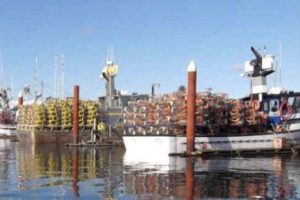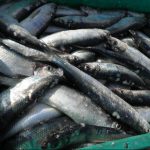Tag Archives: lobster processing

The 2020 P.E.I. spring lobster season that almost didn’t happen because of coronavirus, comes to an end
The spring lobster season on P.E.I. ended July 4 after a late start on May 15, in a year when fishermen faced low prices and catch limits due to a shortage of labour in processing plants. After losing the crucial first two weeks of the season, fishermen saw a glut of lobsters, pulling in more than buyers would take. There are eight processing plants on Prince Edward Island that deal with lobster. “At the end of the day, we had a season. That meant job creation and it also meant wealth creation for the province during a time when a lot of the other sectors were suffering,” >click to read< 19:30
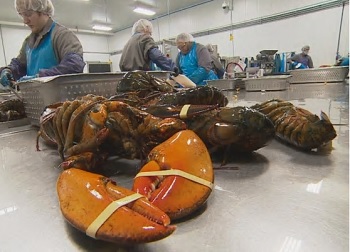
“If lobster people fish, then processors are going to process,” – Processors working on assumed May 1 season start
It is unlikely P.E.I.’s seafood processors will have all the temporary foreign workers they normally have to operate in time for a regular start to the lobster season.,, Jerry Gavin, executive director of the processors’ association, said there will be challenges for his members but they will get the job done if called upon., Gavin recognizes there will be some significant hurdles.”,, Probably one-third of the workforce is temporary foreign workers. Those workers are probably not going to come in here on time. So processors are looking at trying to expand the local labour.” To be ready to start May 1, temporary foreign workers would have to arrive on P.E.I. next week — because they will need to quarantine for 14 days before they can go to the plants. >click to read< 15:51

Changes in lobster processing rules on Massachusetts Legislature’s plate
Democratic and Republican leaders on Beacon Hill are moving toward consensus on legislation that seeks to expand lobster processing, in turn growing markets and giving consumers a wider selection of lobster products at restaurants and local supermarkets. The plan received a major boost from the state’s Division of Marine Fisheries, which in a recent report concluded it would deliver “economic benefits throughout the state’s seafood supply chain,” along with “greater access to desirable seafood products.” >click to read<12:06

House claws at lobster processing restrictions – State Senate Minority Leader Bruce Tarr keeps clawing
State Senate Minority Leader Bruce Tarr sometimes must feel as if the lobster gods are conspiring against him. The Gloucester legislator, on three occasions, has filed a bill in the state Senate to liberalize the Bay State’s lobster processing laws to allow in-state processing and the sale of frozen lobster parts.,, >click to read< – House lawmakers agreed to a policy rider Tuesday as part of their deliberation on a $42.7 billion state budget that would allow authorized persons to process and sell frozen lobster parts in Massachusetts, building on a 2013 law that allowed the sale and processing of shell-on lobster tails that meet certain size requirements. Rep. William Straus, a Mattapoisett Democrat who offered the amendment >click to read<08:44

Bruce Tarr pushing bill to expand lobster processing industry in Bay State
State Senate Majority Leader Bruce Tarr didn’t waste any time in the new legislative calendar to again push the state to liberalize its lobster processing laws to allow in-state processing and sale of raw and frozen lobster parts. And this time, the Republican from Gloucester is armed with a report from the state’s Division of Marine Fisheries that supports the legislative reform and spells out some of the economic benefits of allowing in-state processing rather than sending the live lobsters out of state — often all the way to Canada —for processing. >click to read<22:27

Lobster processing bill OK’d by Mass State Senate
“Massachusetts has the second largest lobster catch in the country,” Tarr said in a statement. “To keep from being left behind, we should expand our ability to process raw and frozen lobster parts. American lobsters are being harvested here and should be prepared for market here instead of Canada or Maine.” The expansion of allowed processing practices, according to Tarr, would enhance local economies in Massachusetts coastal communities such as Gloucester, which is the state’s most lucrative lobster port, and provide local restaurants and food stores with “superior access to the best lobster parts for their customers.” >click to read<19:26
US Increases Lobster Processing as Prices Reach 15-Year High
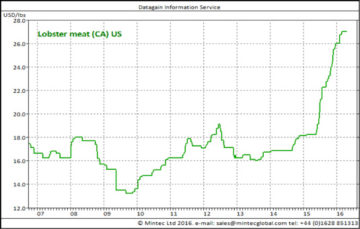 Prices for U.S. lobster meat have climbed to a 15-year high in April, and are up 48% year-over-year. The main reason behind this dramatic rise in the past 12 months has been high demand for lobster products in U.S. food service and retail. So why has processed lobster meat become so popular over the last couple of years? Lobster processing involves extracting the meat from the shell, making it much more consumer-friendly. Processed lobster meat has a longer shelf life and can be stored and shipped better than a live lobster. This, combined with low prices seen in 2014, made the product popular in food service and retail, leading to heavy and successful advertising of processed lobster based products. Read the rest here 11:12
Prices for U.S. lobster meat have climbed to a 15-year high in April, and are up 48% year-over-year. The main reason behind this dramatic rise in the past 12 months has been high demand for lobster products in U.S. food service and retail. So why has processed lobster meat become so popular over the last couple of years? Lobster processing involves extracting the meat from the shell, making it much more consumer-friendly. Processed lobster meat has a longer shelf life and can be stored and shipped better than a live lobster. This, combined with low prices seen in 2014, made the product popular in food service and retail, leading to heavy and successful advertising of processed lobster based products. Read the rest here 11:12
Despite good wages, lobster processing is a hard sell
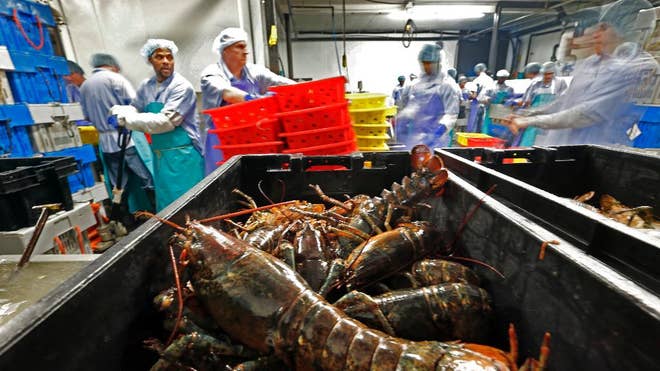 Since Kyle Murdock opened Sea Hag Seafood in 2012, he’s battled the same issue many Maine businesses face: He needs to attract and hold on to good, reliable workers. “It’s tough finding people in the labor market, getting them into work, and getting them trained and maintaining them,” said Murdock, whose plant in Tenants Harbor employs about 75 people. “It’s a huge concern for us.” Read the rest here 10:25
Since Kyle Murdock opened Sea Hag Seafood in 2012, he’s battled the same issue many Maine businesses face: He needs to attract and hold on to good, reliable workers. “It’s tough finding people in the labor market, getting them into work, and getting them trained and maintaining them,” said Murdock, whose plant in Tenants Harbor employs about 75 people. “It’s a huge concern for us.” Read the rest here 10:25
Maine to fight Canada’s hold on lobster processing – A November bond referendum would dedicate $7 million in public money .
 The Canadian Maritimes have long dominated the lobster processing industry, but Maine officials are hoping an upcoming bond referendum will allow the state to claw back the revenue, taxes and jobs it has been sending north of the border for years. Read more here 12:57
The Canadian Maritimes have long dominated the lobster processing industry, but Maine officials are hoping an upcoming bond referendum will allow the state to claw back the revenue, taxes and jobs it has been sending north of the border for years. Read more here 12:57
In Maine, lobster processing finally catches up – Several new plants open to fill the void that last season’s glut exposed, giving the industry more control over its product.
 For years, Maine’s lobster processing industry was on simmer. But with the help of a glut of the state’s signature seafood and a few savvy entrepreneurs who spotted a hole in the market, it’s on its way to a rolling boil.
For years, Maine’s lobster processing industry was on simmer. But with the help of a glut of the state’s signature seafood and a few savvy entrepreneurs who spotted a hole in the market, it’s on its way to a rolling boil.






































